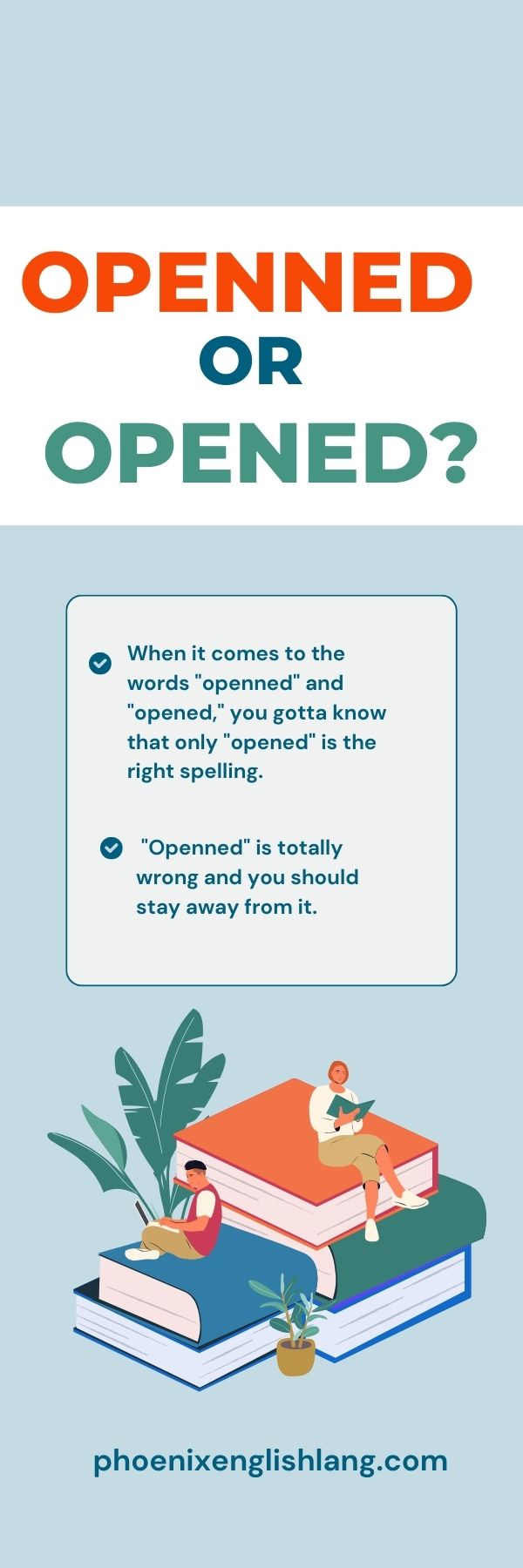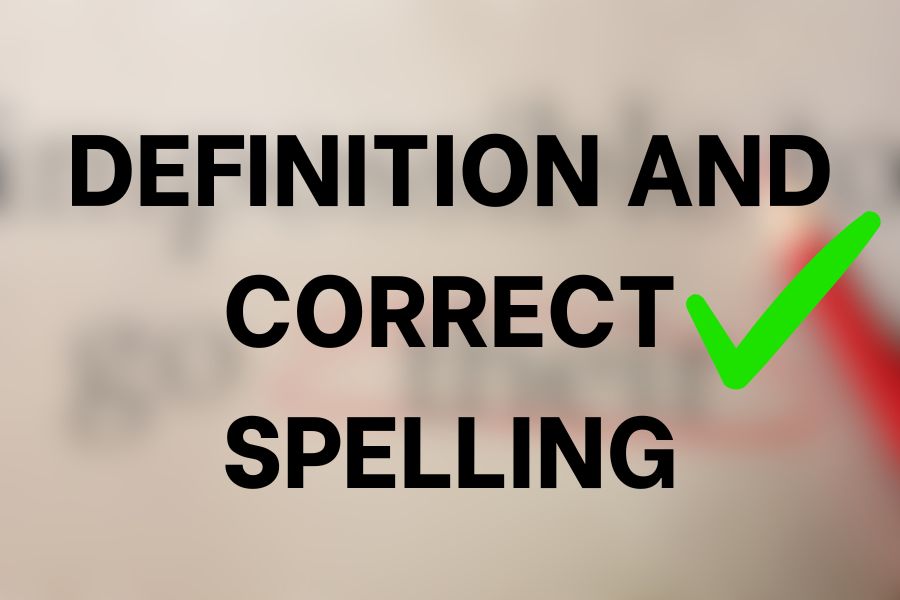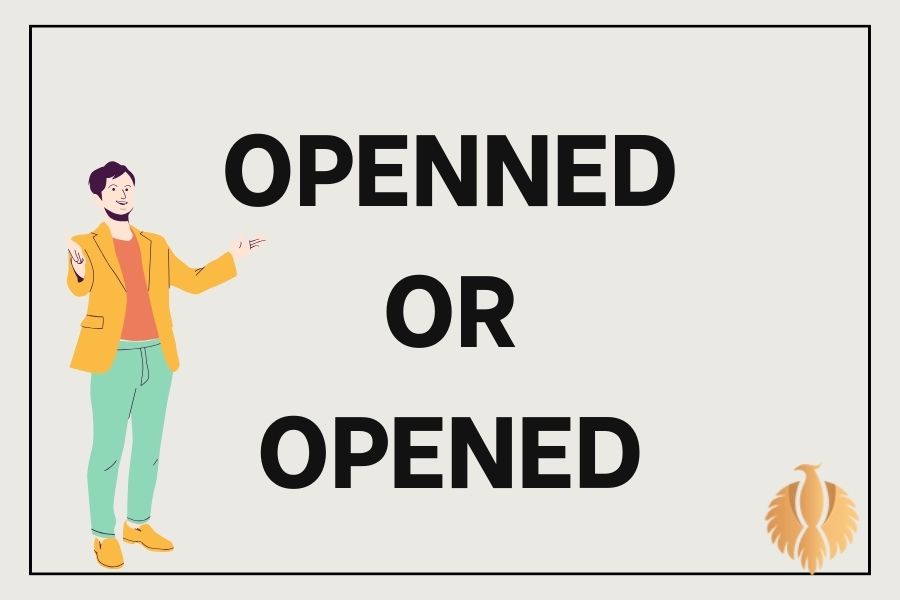In this article, we’re gonna talk about how to spell and use the words “openned” and “opened.”
We’ll give you examples to show you how to use them right in different situations.
In this article, we’re gonna talk about how to spell and use the words “openned” and “opened.”
Understanding the correct spelling and usage of these words is incredibly helpful because it ensures clear and effective communication. Spelling errors can sometimes lead to misunderstandings or give a negative impression, especially in professional or academic settings.
By mastering the correct forms, you can enhance your writing skills and present yourself more confidently in various contexts.
We’ll give you examples to show you how to use them right in different situations. The distinction between “openned” and “opened” is crucial, as one is a common misspelling while the other is the correct past tense of the verb “open.”
Knowing the difference can help you avoid common mistakes and improve the accuracy of your writing. This is particularly important in written communication, where errors can be more noticeable and impactful.
First, let’s clarify the correct spelling. The word “opened” is the past tense and past participle of the verb “open.” It is used to describe an action that has already been completed.
For example, you might say, “She opened the door” or “The store opened at 9 AM.” On the other hand, “openned” is a misspelling and should be avoided.
Understanding this distinction is essential for anyone looking to improve their English language skills, whether you’re a native speaker or learning English as a second language.
Using the correct spelling not only enhances your credibility but also ensures that your message is understood as intended. In professional settings, such as business correspondence or academic writing, correct spelling is a reflection of your attention to detail and your commitment to quality.
It can also affect how others perceive your competence and professionalism. By consistently using the correct form, “opened,” you demonstrate your proficiency in the language and your dedication to clear communication.
Now, let’s explore some examples to illustrate the correct usage of “opened.” Consider the following sentences:
- She opened the book and began to read.
- The new restaurant opened last week and has been very popular.
3.The company opened a new branch in the city.
In each of these examples, “opened” is used correctly to indicate that the action of opening has already taken place.
These sentences show how versatile the verb “open” can be, applying to various contexts such as books, restaurants, windows, and businesses.
By practicing with these examples, you can become more comfortable using “opened” in your own writing.
Additionally, understanding the correct usage of “opened” can help you avoid common pitfalls in spelling. English can be a tricky language with many irregular verbs and exceptions to rules.
However, by paying attention to common patterns and practicing regularly, you can improve your spelling and usage skills. This will not only make your writing more accurate but also more polished and professional.
In conclusion, mastering the correct spelling and usage of “opened” is a valuable skill that can enhance your communication abilities.
By avoiding the common misspelling “openned” and using “opened” correctly, you can ensure that your writing is clear, accurate, and professional.
This attention to detail is particularly important in professional and academic contexts, where spelling errors can have a significant impact.
Through practice and awareness, you can improve your language skills and present yourself more confidently in any situation.
So, follow along as we delve deeper into the correct spelling and usage of “opened.” We’ll provide more examples and tips to help you master this aspect of English grammar.
By the end of this article, you’ll have a solid understanding of how to use “opened” correctly and avoid common spelling mistakes. Let’s get started and enhance your writing skills together!
Which one is correct? Openned or Opened?

When it comes to the words “openned” and “opened,” you gotta know that only “opened” is the right spelling.
“Openned” is totally wrong and you should stay away from it.
In my classes, I always stress the importance of using good grammar and spelling to make sure you get your point across.
So, it’s super important to remember that “opened” is the right word to use in lots of different situations.
1. Definition and Correct Spelling

In my classes, I always stress the importance of understanding the right spelling and definitions of words.
When it comes to the words “openned” and “opened,” it’s super important to know that only “opened” is the right spelling.
“Openned” is totally wrong and should be avoided. Now, let’s get into the definition of “opened.”
It’s the past tense and past participle form of the verb “open.”
This means that it’s used to describe an action that already happened in the past.
For example, “She opened the door” or “He opened the box.” Using the right spelling is crucial for effective communication.
It makes sure that our messages are clear and easily understood by others.
In my classes, I tell my students to pay attention to proper grammar and spelling, ’cause it shows their attention to detail and professionalism.
Remember, using “opened” instead of “openned” will help you express your thoughts accurately and confidently.
So, let’s keep giving correct spelling and grammar priority in our writing and conversations.
You might also enjoy: Targetted or Targeted?Examples + Spelling [2024]
2. Usage in Everyday Language

In my classes, I always talk about how we use words in everyday language.
When it comes to the word “opened,” it’s really common to use it when we want to say that something is accessible or available.
For example, I teach my students to say, “She opened the door and welcomed her guests” or “He opened the box to show what’s inside.”
By using “opened” in these situations, we can really get across the idea of making something accessible or revealing what’s inside.
It’s important to remember how to use “opened” correctly so that we can communicate clearly and to the point in our everyday conversations.
3. Usage in Business and Technology

In my classes, I always talk about how we use language in different areas like business and technology.
When it comes to these fields, the word “opened” is a big deal.
In the business world, we use “opened” a lot to talk about starting or activating systems, applications, or accounts.
For example, I always tell my students to say things like “The company opened a new branch in the city”
Similarly, in technology, we use “opened” a lot to talk about launching or activating different digital platforms or services.
For instance, I always explain to my students that they can say “The app opened with a user-friendly interface” or “I opened the software to start my design project.” These examples show how we use “opened” to talk about starting technological processes.
Knowing the right way to use “opened” in business and technology is really important for clear and precise communication in these fields.
It helps professionals accurately describe their actions and intentions.
Point:
The mix-up between “openned” and “opened” happens a lot because people make a spelling mistake.
The right way is to say “opened,” which is the past tense and past participle of “open.”
But sometimes, folks add an extra “n” by accident and end up saying “openned.” This mistake could be because of different things, like making a typo, not knowing the right spelling, or just hitting the wrong key while typing.
So, it’s important to read over and check our writing to make sure it’s right and avoid these common mistakes.
You might also enjoy: Infront or In Front: Definitions + Examples [2024]
4. Usage in Literature and Art

In my classes, I often talk about how words are used in literature and art, ’cause they have a lot of power in showing feelings and ideas.
When it comes to the word “opened,” you can use it in a metaphorical way to show when something important is revealed.
This makes literary works and art more interesting and meaningful.
For example, I teach my students to think about how a book can “open” up a whole new world of imagination for readers and take them to different places.
And an artist’s exhibition can “open” up a conversation about important social issues and make people think and reflect.
By understanding the metaphorical use of “opened,” students can make their analysis of literature and art even better.
It’s through these thoughtful ways of using words that literature and art really come alive and make people feel strong emotions and have a lasting impact on them.
5. Usage in Sports and Events

In the world of sports and events, the word “opened” is super important and is usually linked to the start or kick-off of different activities.
It means the beginning of something new, like discovering new possibilities and getting hyped up.
One of the biggest times you’ll hear “opened” is during the fancy opening ceremony of major sports events.
These crazy shows mark the official start of competitions like the Olympic Games, FIFA World Cup, or the Super Bowl.
The opening ceremony is like a mind-blowing performance of culture, art, and the introduction of nations or teams.
It sets the stage for the upcoming battles and shows how the sporty world is all about unity and diversity.
Also, “opened” is used when they talk about the opening of new sports places or stadiums.
These cool venues are made to give athletes and fans the best experience ever.
When these places open, there’s usually a huge fuss because sports lovers can’t wait to see their favorite teams or athletes compete in these new arenas.
Opening a new stadium means progress, growth, and the evolution of sports. On top of sports stuff, “opened” is used a lot when talking about exhibitions and trade shows.
These events are where businesses and industries can show off their newest products, ideas, and services.
When an exhibition hall or trade show floor opens, it’s like the start of a busy marketplace where professionals and customers gather to explore, meet, and do business stuff.
Opening these events usually means there’s a ribbon-cutting thing, speeches, and showing off cool new tech or designs.
Also, “opened” can be about when ticket sales start for super exciting sports matches or events.
When tickets are up for grabs, fans go crazy trying to get their seats so they can see their fave teams or athletes in action.
The start of ticket sales gets everyone excited and in a hurry because they want to be part of the live experience.
Also, “opened” can be used to talk about starting sports leagues or tournaments.
Like when a new season starts in big sports leagues like the NBA or NFL, it means a bunch of games are about to go down and decide who the champs are gonna be.
Fans can’t wait for the new season to start because it promises a ton of intense competition, incredible performances, and the pursuit of being the best.
So, to sum it all up, “opened” is used in a bunch of different ways in sports and events.
From the fancy opening ceremonies of big sports events to opening new sports places, exhibitions, or ticket sales, this word means the start of exciting journeys, new opportunities, and gets everyone pumped up, like athletes, fans, and participants.
It’s a word that captures the spirit of playing fair, being tight with your teammates, and the thrill of having unforgettable experiences.
You might also enjoy: How Are You Fairing or Faring? Differences + Examples
Why is “openned” not a valid word in the English language?
I apologize for the confusion. “Openned” is not a standard spelling in English. The correct spelling is “opened.” “Openned” is a common misspelling, and while it may be used in informal or colloquial writing, it is not considered a valid word in standard English.
How can one improve their spelling skills to avoid using incorrect words like “openned”?
Improving spelling skills can be achieved through various methods:
- Reading regularly: Reading a wide variety of materials, such as books, articles, and newspapers, can expose you to correct spellings and help reinforce the correct usage of words.
- Using a dictionary: When in doubt about the spelling of a word, consult a dictionary to confirm the correct spelling and learn the proper usage.
- Practicing spelling: Regularly practicing spelling through exercises, quizzes, or word games can help reinforce correct spellings and improve overall proficiency.
- Understanding spelling rules: Learning and understanding spelling rules, such as suffixes, prefixes, and word origins, can provide insight into the correct formation of words.
- Seeking feedback: Asking for feedback from others, such as teachers, peers, or language experts, can help identify areas for improvement and provide valuable guidance.
- Using spell-check tools: Utilizing spell-check tools in word processing software or online can help identify and correct spelling errors.
By incorporating these strategies into your learning routine, you can enhance your spelling skills and reduce the likelihood of using incorrect words.
What can I say instead of opened?
Here are some alternatives to the word “opened,” depending on the context:
- Unsealed
- Unlocked
- Revealed
- Uncorked
- Lifted
- Unwrapped
- Unfastened
- Accessible
- Exposed
- Loosened
Choose the word that best fits the specific situation you’re describing.
What is the past perfect tense of open?
The past perfect tense of the verb “open” is “had opened.” For example, “She had opened the door before I arrived.” In this sentence, “had opened” indicates an action that was completed before another past action.
What is the proper tense of open?
The proper tenses of the verb “open” are as follows:
– Present Tense: open
– Past Tense: opened
– Present Participle: opening
– Past Participle: opened
These tenses can be used to express actions in the present, past, and future, as well as in continuous or perfect forms.
Does the word opened exist?
Yes, “opened” is a valid word. It is the past tense and past participle form of the verb “open.” For example:
– Present: “I open the box.”
– Past: “Yesterday, I opened the box.”
– Past Participle: “I have opened many boxes.”
So, “opened” is indeed a legitimate word in English.
What’s another way to say opened up?
Another way to express “opened up” depends on the specific context. Here are some alternatives:
- Unveiled
- Revealed
- Exposed
- Disclosed
- Unfolded
- Unlocked
- Expanded
- Unsealed
- Uncorked
- Allowed access
Choose the synonym that best fits the nuance and tone you want to convey in your sentence or description.
What does the idiom open to mean?
The idiom “open to” can have a few different meanings depending on the context. Here are a couple of common interpretations:
- Receptive or Willing:
– If someone is “open to” something, it means they are receptive, willing, or accepting of new ideas, suggestions, or experiences. For example, “She’s open to trying different cuisines.”
- Available or Accessible:
– “Open to” can also mean something is available or accessible. For instance, “The park is open to the public,” suggests that the park is available for anyone to enter or use.
Understanding the specific context in which “open to” is used helps clarify its meaning in a given sentence.
What is the phrasal verb of open?
The phrasal verb associated with “open” is “open up.” This phrasal verb can have various meanings based on context, including:
- Begin Operation:
– “The store opens up at 9 AM.”
- Reveal or Disclose:
– “He finally opened up about his feelings.”
- Expand or Unfold:
– “As we climbed, the view started to open up.”
- Make Accessible:
– “They decided to open up the garden to the public.”
These are just a few examples, and the meaning can vary depending on the context in which “open up” is used.
Conclusion
In summary, the correct spelling is “opened,” not “openned.” It is important to use the appropriate spelling to ensure clear and effective communication.
Whether in everyday language, business and technology, literature and art, or sports and events, understanding the correct usage of “opened” will help convey your message accurately.

Hi, welcome to my blog! My name is Omid and I am thrilled to have you here! I am an English language teacher with 12 years of experience and hold multiple international certifications (TESOL, IELTS, TOEFL, PTE, CELTA). Additionally, I hold a PhD in Applied Linguistics with a specialization in Teaching English as a Second Language (TESL), which fuels my passion for teaching English and assisting others in mastering the language. To me, nothing is more rewarding than helping individuals enhance their English language abilities through various methods. So, let’s embark on this journey of learning English together.




